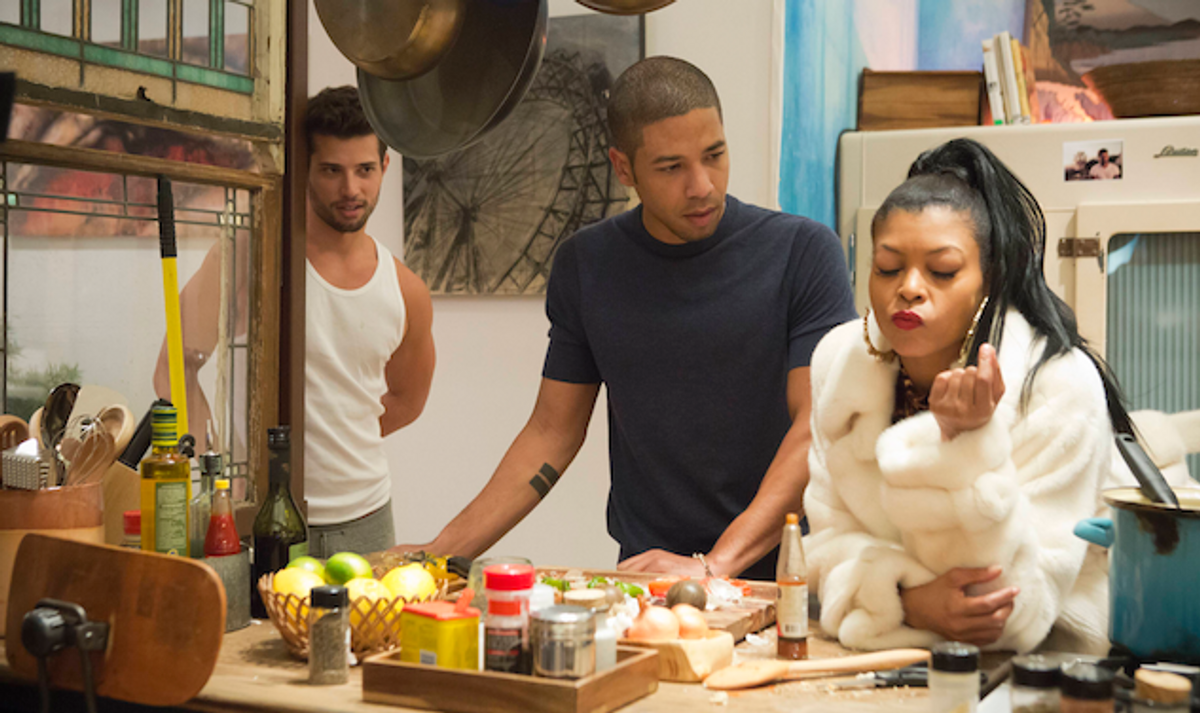Empire, Fox's booming, ultra-addictive hip-hop drama, operates at a very specific decibel. Dial down the volume of Lee Daniels's distinct predilection for artful sensationalism, then dial up the tenacity of the series' home network (which has taken risks with LGBT-friendly shows like Glee, but never exhibited the grit of cable channels such as FX), and you've just about nailed the tone of this new primetime soap. That mid-level marriage has certainly struck a chord with Empire's growing viewership, and according to Daniels, who serves as co-creator and executive producer of the show (and directed the first two episodes), choosing the venue for his blingy project was a very deliberate move.
Speaking from Empire's editing booth in Los Angeles this week, Daniels asserts that "every network imaginable wanted this show," and that "there was a bidding war" over which one would ultimately broadcast the urban, pseudo-Shakespearean hit (countless King Lear comparisons have surfaced regarding music mogul Lucius, played by Terrence Howard, choosing which of his three sons will inherit his business). Daniels mentions HBO, which surely would've given him more freedom to concoct scenes akin to, say, Nicole Kidman's telepathic orgasm in The Paperboy. So, why Fox?
"I knew half of my family couldn't afford HBO," Daniels says. "The audience that is important for this show can't afford HBO. I'm talking about people that are impoverished, or people that haven't come out of their communities, or haven't left their blocks or their cities, and haven't seen the world. Oftentimes, a lot of these people are homophobic, I feel."
A gay filmmaker, Daniels is of course referencing viewer exposure to the prevalence of gay character Jamal (Jussie Smollett), an R&B crooner who's among the trio vying for Lucius's crown, and whose storyline is the most riveting and revolutionary on the show. (Jamal's straight brothers, Andre and Hakeem, are played by Trai Byers and Bryshere Gray, respectively.) Since Empire's January 7 premiere, much has been made of the novelty of a gay male character of color having such visibility on television, let alone a gay male character living and working within the historically homophobic hip-hop industry. But Daniels's admirable aim to plant Empire in the widely accessible hands of Fox speaks to a broader trend of queer prominence on today's network-TV menu.
For example, while no hungry gay viewer with an HBO subscription should deny themselves the virtues of Looking, they no longer need that subscription to see themselves vividly reflected on television. Want frisky sex a la Grey's Anatomy that's between two men and doesn't involve nelly, Jack McFarland-y stereotypes? ABC's How to Get Away with Murder now has cunning law student Connor Walsh (Jack Falahee) for that. And thanks to powerful gay producers like Greg Berlanti, LGBT elements are being folded into popular comic book shows like Arrow and The Flash, both of which air on the CW.
Admittedly, all of these shows include a certain outsized, orientation-transcending element that, presumably, make gay content more accessible for those who might not be seeking it out. In How to Get Away with Murder, it's the dishy, over-the-top depiction of the world of defense attorneys. In The Flash, which features queer villain Pied Piper played by out actor Andy Mientus, it's the hyper-real veil of superhero fantasy. In Empire, it's a no-brainer: the ever-unifying power of music. Gay viewers and their allies can root for Jamal in his struggle to come out and defy his bigoted father, but everyone can root for his undeniable talent, which Smollett, a highly gifted actor and vocalist, makes evident in his knockout performance of "Good Enough," the show-stopper of Empire's pilot.
 "That content opens you up," Daniels says. "Music is universal. Not just from a racial perspective, but also from a sexual perspective. It brings everyone together--everyone can connect to music."
"That content opens you up," Daniels says. "Music is universal. Not just from a racial perspective, but also from a sexual perspective. It brings everyone together--everyone can connect to music."
A sterling example of how music can connect people of different mindsets actually manifested behind the scenes during Empire's pre-production. Super-producer Tim "Timbaland" Mosley, a friend of Daniels's who crafts the series' catchy original tracks, wasn't initially aware of the nature of Jamal's storyline, and Daniels recalls some initial discomfort from the beat-master who's worked with everyone from Madonna to Missy Elliot.
"I pitched the pilot to him, and he came back with this incredible, breathtaking music in 48 hours," Daniels says. "And soon it was time for me to show him the pilot. My instinct told me to leave when Jamal and [his boyfriend] Michael kiss, so I got up to go to the bathroom. When I came back, I knew [Timbaland] was fascinated by seeing his music in the work, but he said, 'Those guys kissing, man. Wow.' [The comment] could be construed negatively or positively, so I didn't push it. I just didn't wanna go there. Again, my instinct--or maybe my inner child or something--told me not to."
When Timbaland's wife and children were also brought in to to view the premiere episode, Daniels says that the music maestro asked that his kids step out of the room during the kissing scene, and Daniels, claiming to be "in work mode," opted not to "get into a political conversation or give an opinion." Since then, though, Daniels says that Timbaland, whom he refers to as a "buddy," has changed his tune.
"What's so great about this story is that it comes full circle," Daniels says. "[Working on this show has] changed [Timbaland's] opinion on how he feels about gays. He said it. And I remember hanging up the phone and being very emotional after talking to him, and after him telling me that. And how he really had this epiphany. It was beautiful, and it deepened our friendship." (To bring things even more full circle, Timbaland's wife, Monique Idlett, is involved in Empire's costume design, while Daniels's partner, stylist Jahil Fisher, is set to work with her as a consultant. The two couples have had dinner together, Daniels says.)
Ideally, what happened between Daniels and Timbaland is now happening between Empire and its audience. It may very well be a micro version of what's occurring on a macro scale--a scale, by the way, that nobody anticipated. Reportedly, Empire's third episode netted a whopping 10.9 million viewers, a tally that far exceeded the expectations of Daniels and Fox, and one that already prompted the network to green-light a second season. It's a jump that's all but unheard of when it comes to new shows, whose ratings usually dip in the wake of their premieres, and with Jamal's arc only growing in depth and visibility (thanks in part to his ruthless, yet supportive, mother, played by Taraji P. Henson), we optimists can hope that many more minds will be opened--and that no one will be leaving the room.
Follow R. Kurt Osenlund on Twitter @AddisonDeTwitt


































 "That content opens you up," Daniels says. "Music is universal. Not just from a racial perspective, but also from a sexual perspective. It brings everyone together--everyone can connect to music."
"That content opens you up," Daniels says. "Music is universal. Not just from a racial perspective, but also from a sexual perspective. It brings everyone together--everyone can connect to music."






















































